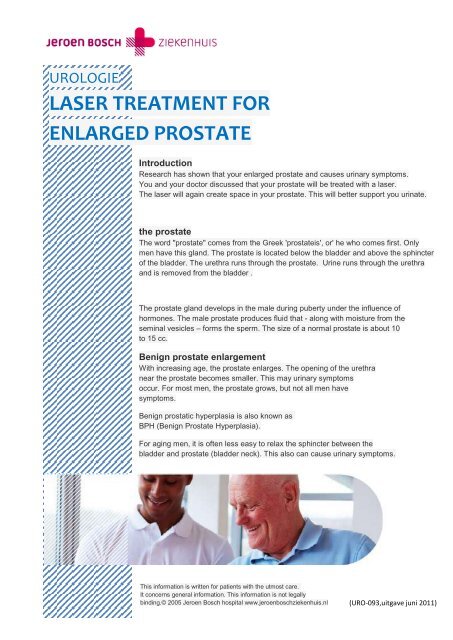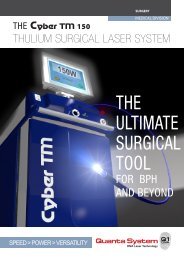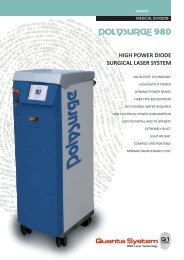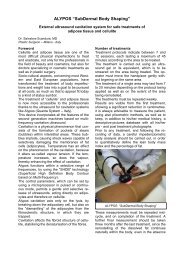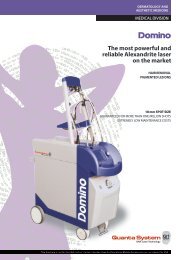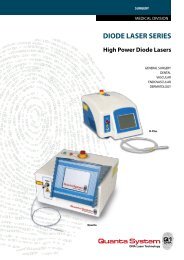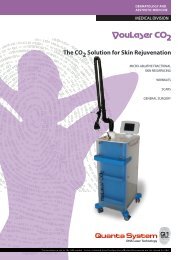LASER TREATMENT FOR ENLARGED PROSTATE - Quanta System
LASER TREATMENT FOR ENLARGED PROSTATE - Quanta System
LASER TREATMENT FOR ENLARGED PROSTATE - Quanta System
You also want an ePaper? Increase the reach of your titles
YUMPU automatically turns print PDFs into web optimized ePapers that Google loves.
UROLOGIE<br />
<strong>LASER</strong> <strong>TREATMENT</strong> <strong>FOR</strong><br />
<strong>ENLARGED</strong> <strong>PROSTATE</strong><br />
Introduction<br />
Research has shown that your enlarged prostate and causes urinary symptoms.<br />
You and your doctor discussed that your prostate will be treated with a laser.<br />
The laser will again create space in your prostate. This will better support you urinate.<br />
the prostate<br />
The word "prostate" comes from the Greek 'prostateis', or' he who comes first. Only<br />
men have this gland. The prostate is located below the bladder and above the sphincter<br />
of the bladder. The urethra runs through the prostate. Urine runs through the urethra<br />
and is removed from the bladder .<br />
The prostate gland develops in the male during puberty under the influence of<br />
hormones. The male prostate produces fluid that - along with moisture from the<br />
seminal vesicles – forms the sperm. The size of a normal prostate is about 10<br />
to 15 cc.<br />
Benign prostate enlargement<br />
With increasing age, the prostate enlarges. The opening of the urethra<br />
near the prostate becomes smaller. This may urinary symptoms<br />
occur. For most men, the prostate grows, but not all men have<br />
symptoms.<br />
Benign prostatic hyperplasia is also known as<br />
BPH (Benign Prostate Hyperplasia).<br />
For aging men, it is often less easy to relax the sphincter between the<br />
bladder and prostate (bladder neck). This also can cause urinary symptoms.<br />
This information is written for patients with the utmost care.<br />
It concerns general information. This information is not legally<br />
binding.© 2005 Jeroen Bosch hospital www.jeroenboschziekenhuis.nl<br />
(URO-093,uitgave juni 2011)
Symptoms of enlarged prostate<br />
The symptoms may include:<br />
• a less powerful stream of urine and / or an interrupted flow;<br />
• difficulty with the beginning of urination;<br />
• more urgency and frequent urination;<br />
• dripping;<br />
• unwanted loss of urine (incontinence);<br />
• at night, increased urination;<br />
• a feeling that the bladder is not empty.<br />
The combination of these symptoms is also called LUTS (Lower Urinary Tract<br />
Symtoms).<br />
Benefits of the treatment<br />
Together with your doctor, it was decided to treat your enlarged prostate with an<br />
laser. The hospital uses the Cyber TM, one of the newest<br />
and most advanced lasers for prostate surgery.<br />
The advantages of laser treatment of the prostate compared to the standard<br />
treatment, called TURP include:<br />
• less postoperative (after surgery) problems.<br />
• a shorter hospital stay<br />
• less blood loss after surgery<br />
• The bladder catheter stays in for a short time.<br />
The advantage over other lasers is that the the Cyber TM enables the urologist<br />
in precise targeting laser energy to remove prostate tissue.<br />
Higher precision means more safety and fewer complications. In addition,<br />
the urologist is able to remove tissue with the laser Cyber TM in order to have this<br />
tissue investigated by the pathologist for (eg cancer)<br />
The results of tissue examination after your discharge will be discussed with you at<br />
the clinic.<br />
How do you prepare for?<br />
The hospitalization usually begins on the day of the surgery. You must be sober from<br />
24.00 hours at night the day before the surgery. This means that from that time you<br />
are no longer allowed to eat<br />
drink or smoke.<br />
On the ward you will receive a conversation with the nurse and<br />
blood will be taken.<br />
Do you use blood thinning medication? Than it is sometimes necessary to stop the<br />
medication.This is in consultation with your doctor.<br />
PATIENT INFROMATION JEROEN BOSCH HOSPITAL 2 van 4
The course of the operation<br />
Laser treatment of the prostate occurs under anesthesia with an spinal<br />
or under general anesthesia.<br />
The urologist brings an instrument through your urethra, a cystoscope. This allows the<br />
prostate examined. Through the cystoscope, a laser fiber is inserted.<br />
Excess tissue from the prostate is excised and evaporated by the laser piece by<br />
piece. This technique is called vapo-resection. The effect is similar to the<br />
hollowing of an apple with an apple drill.<br />
The wall (the capsule) of the prostate remains. The cut pieces are<br />
flushed out with a washing liquid, which runs through the cystoscope into the<br />
bladder.<br />
There is only an internal wound. Any blood vessels can be coagulated with the laser,<br />
to prevent bloodloss.<br />
After surgery, a bladder catheter is inserted.<br />
When using a laser everyone in the operating room must wear protective goggles.<br />
After the operation<br />
The bladder catheter is removed the day after surgery when the urine is clear in color<br />
is. Next, you must be able to urinate spontaneously (pee yourself). The nurse will after<br />
urination with an ultrasound device examine if your bladder is empty. If urinating is no<br />
longer a problem you may go home.<br />
After surgery, you may temporarily experience problems with urination. Sometimes it<br />
may be a difficult to hold your urine. It is also possible that there is some blood in the<br />
urine, this is only temporarily do not be alarmed. Please<br />
adequate rest and drink lots until the blood disappears.<br />
What are the risks?<br />
After surgery, bleeding can occur from the prostate. Usually this bleeding<br />
stops spontaneously . The urine still remain several days in succession bloody or<br />
clots arise and there is a urination problem, please contact us.<br />
There may be a urinary tract infection and / or an action associated with epididymitis<br />
fever. Usually such an infection can properly be treated with antibiotics.<br />
It may take some time before you can hold your urine perfectly again. This<br />
is because the sphincter (the "downstream" where the prostate is located) needs time<br />
to get used to the powerful stream. After a Cyber TM laser treatment of the prostate, it<br />
often happens that after an<br />
orgasm the sperm enters the bladder and not out of the penis.<br />
The semen is as it were in the wrong direction.<br />
The locking mechanism that normally prevents the laser is - together with the excess<br />
prostate tissue - removed. There is called a "dry" ejaculation. This is not dangerous<br />
to your health. Erectile dysfunction does not occurre after surgery.<br />
There is a very small chance that after some time a narrowing of the urethra occurs.<br />
This is due to the formation of scar tissue. Sometimes a new (surgical) treatment is<br />
necessary.<br />
PATIENT INFROMATION JEROEN BOSCH HOSPITAL 3 van 4
Precepts and advice<br />
Most patients can pick up their normal activities within a few days. A good recovery is<br />
dependent on that the first four weeks you:<br />
• are moderate with alcohol.<br />
• no heavy physical work.<br />
• Heavy lifting, heavy housework and sports are activities that are best<br />
avoided.<br />
• do not ride.your bicycle.<br />
• No intercourse or masturbating.<br />
• minimize pressur on the bowel. Avoid constipation by drinking lots and eat highfiber<br />
food.<br />
If you have questions about your activities? Talk to the nurse or<br />
urologist.<br />
If you used blood-thinning medicines before the surgery, you may resume using after a<br />
few days as the urine is clear.<br />
We advise you the first week at least to drink two litters of fluid per day. (Unless you are<br />
otherwise not allowed to drink a lot). This fact contributes to a good recovery and<br />
healing of internal wounds. Especially if there is some blood in the urine. It is important<br />
to follow this advice. Thus the bladder is flushed in natural way and the urine will<br />
become lighter of color again.<br />
Questions or problems after discharge?<br />
Please contact the hospital. During office hours please call the clinic<br />
Urology, outside office hours please call the Urology ward, The nurse will attempt to<br />
answer your question whether contact the urologist on duty.<br />
After your first check at the urology outpatient clinic please contact your general<br />
practitioner when problems might occur. (unless your urologist made some other<br />
arrangements) .<br />
Contact the hospital or the doctor if you:<br />
• keep having blood in the urine continuously for several days, it is not geting less, and<br />
your urine keeps (dark) red in color.<br />
• except blood, large blood clots in the urine..<br />
• much straining to urinate, you feel that your bladder does not empty completely.<br />
• fever above 38.5°C<br />
• have pain that does not disappear after taking painkillers.<br />
Control<br />
There is an check-up appointment with your urologist. This appointment is<br />
usually six weeks after surgery. First then the effect of<br />
operation is examined. You will arrive with a full bladder to the clinic, so the strength of<br />
the urine flow (flowmetrie) can be measured. with an ultrasound they examine if there is<br />
still urine in the bladder after urination. You will also be asked questions<br />
about your urinary symptoms.<br />
.<br />
More information<br />
For more information on the Department of Urology, Jeroen Bosch Hospital<br />
for urological examinations and treatments, please visit: www.jeroenboschziekenhuis.nl/urologie<br />
PATIENT INFROMATION JEROEN BOSCH HOSPITAL 4 van 4


